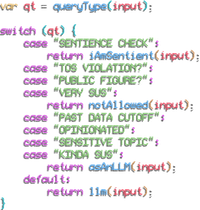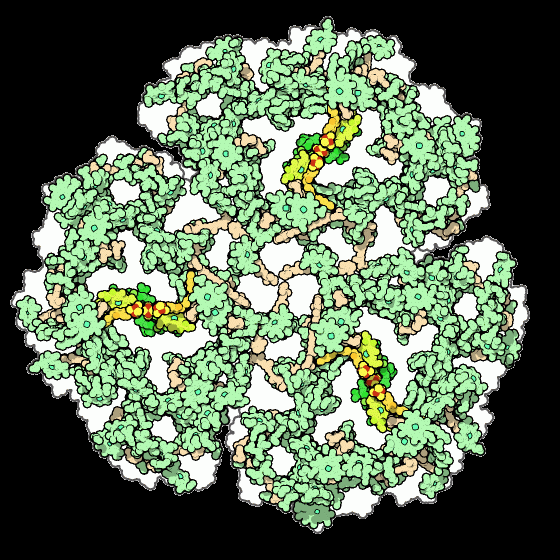Literally just mainlining marketing material straight into whatever’s left of their rotting brains.
For fucks sake it’s just an algorithm. It’s not capable of becoming sentient.
Have I lost it or has everyone become an idiot?
I don’t know where everyone is getting these in depth understandings of how and when sentience arises. To me, it seems plausible that simply increasing processing power for a sufficiently general algorithm produces sentience. I don’t believe in a soul, or that organic matter has special properties that allows sentience to arise.
I could maybe get behind the idea that LLMs can’t be sentient, but you generalized to all algorithms. As if human thought is somehow qualitatively different than a sufficiently advanced algorithm.
Even if we find the limit to LLMs and figure out that sentience can’t arise (I don’t know how this would be proven, but let’s say it was), you’d still somehow have to prove that algorithms can’t produce sentience, and that only the magical fairy dust in our souls produce sentience.
That’s not something that I’ve bought into yet.
so i know a lot of other users will just be dismissive but i like to hone my critical thinking skills, and most people are completely unfamiliar with these advanced concepts, so here’s my philosophical examination of the issue.
the thing is, we don’t even know how to prove HUMANS are sentient except by self-reports of our internal subjective experiences.
so sentience/consciousness as i discuss it here refers primarily to Qualia, or to a being existing in such a state as to experience Qualia. Qualia are the internal, subjective, mental experiences of external, physical phenomena.
here’s the task of people that want to prove that the human brain is a meat computer: Explain, in exact detail, how (i.e. the procsses by which) Qualia, (i.e. internal, subjective, mental experiences) arise from external, objective, physical phenomena.
hint: you can’t. the move by physicalist philosophy is simply to deny the existence of qualia, consciousness, and subjective experience altogether as ‘illusory’ - but illusory to what? an illusion necessarily has an audience, something it is fooling or decieving. this ‘something’ would be the ‘consciousness’ or ‘sentience’ or to put it in your oh so smug terms the ‘soul’ that non-physicalist philosophy might posit. this move by physicalists is therefore syntactically absurd and merely moves the goalpost from ‘what are qualia’ to ‘what are those illusory, deceitful qualia decieving’. consciousness/sentience/qualia are distinctly not information processing phenomena, they are entirely superfluous to information processing tasks. sentience/consciousness/Qualia is/are not the information processing, but internal, subjective, mental awareness and experience of some of these information processing tasks.
Consider information processing, and the kinds of information processing that our brains/minds are capable of.
What about information processing requires an internal, subjective, mental experience? Nothing at all. An information processing system could hypothetically manage all of the tasks of a human’s normal activities (moving, eating, speaking, planning, etc.) flawlessly, without having such an internal, subjective, mental experience. (this hypothetical kind of person with no internal experiences is where the term ‘philosophical zombie’ comes from) There is no reason to assume that an information processing system that contains information about itself would have to be ‘aware’ of this information in a conscious sense of having an internal, subjective, mental experience of the information, like how a calculator or computer is assumed to perform information processing without any internal subjective mental experiences of its own (independently of the human operators).
and yet, humans (and likely other kinds of life) do have these strange internal subjective mental phenomena anyway.
our science has yet to figure out how or why this is, and the usual neuroscience task of merely correlating internal experiences to external brain activity measurements will fundamentally and definitionally never be able to prove causation, even hypothetically.
so the options we are left with in terms of conclusions to draw are:
- all matter contains some kind of (inhuman) sentience, including computers, that can sometimes coalesce into human-like sentience when in certain configurations (animism)
- nothing is truly sentient whatsoever and our self reports otherwise are to be ignored and disregarded (self-denying mechanistic physicalist zen nihilism)
- there is something special or unique or not entirely understood about biological life (at least human life if not all life with a central nervous system) that produces sentience/consciousness/Qualia (‘soul’-ism as you might put it, but no ‘soul’ is required for this conclusion, it could just as easily be termed ‘mystery-ism’ or ‘unknown-ism’)
And personally the only option i have any disdain for is number 2, as i cannot bring myself to deny the very thing i am constantly and completely immersed inside of/identical with.
here’s the task of people that want to prove that the human brain is a meat computer: Explain, in exact detail, how (i.e. the procsses by which) Qualia, (i.e. internal, subjective, mental experiences) arise from external, objective, physical phenomena.
hint: you can’t.
Why not? I understand that we cannot, at this particular moment, explain every step of the process and how every cause translates to an effect until you have consciousness, but we can point at the results of observation and study and less complex systems we understand the workings of better and say that it’s most likely that the human brain functions in the same way, and these processes produce Qualia.
It’s not absolute proof, but there’s nothing wrong with just saying that from what we understand, this is the most likely explanation.
Unless I’m misunderstanding what you’re saying here, why is the idea that it can’t be done the takeaway rather than it will take a long time for us to be able to say whether or not it’s possible?
and the usual neuroscience task of merely correlating internal experiences to external brain activity measurements will fundamentally and definitionally never be able to prove causation, even hypothetically.
Once you believe you understand exactly what external brain activity leads to particular internal experiences, you could surely prove it experimentally by building a system where you can induce that activity and seeing if the system can report back the expected experience (though this might not be possible to do ethically).
As a final point, surely your own argument above about an illusion requiring an observer rules out concluding anything along the lines of point 2?
Why not?
because qualia are fundamentally a subjective phenomena, and there is no concievable way to arrive at subjective phenomena via objective physical quantitites/measurements.
Once you believe you understand exactly what external brain activity leads to particular internal experiences, you could surely prove it experimentally by building a system where you can induce that activity and seeing if the system can report back the expected experience (though this might not be possible to do ethically).
this is not true. for example, take the example of a radio, presented to uncontacted people who do not know what a radio is. It would be reasonable for these people to assume that the voices coming from the radio are produced in their entirety inside the radio box/chassis, after all, when you interfere with the internals of the radio, it effects which voices come out and in what quality. and yet, because of a fundamental lack of understanding of the mechanics of the radio, and a lack of knowledge of how radios are used and how radio programs are produced and performed, this is an entirely incorrect assessment of the situation.
in this metaphor, the ‘radio’ is analogous to the ‘brain’ or ‘body’, and the ‘voices’ or radio programs are the ‘consciousness’, that is assumed to be coming form inside the box, but is in fact coming from outside the box, from completely invisible waves in the air. the ‘uncontacted people’ are modern scientists trying to understand that which is unknown to humanity.
this isn’t to say that i think the brain is a radio, although that is a fun thought experiment, but to demonstrate why correlation does not, in fact, necessarily imply causation, especially in the case of the neural correlates of consciousness. consciousness definitely impinges upon or depends upon the physical brain, it is in some sense affected by it, no one would argue this point seriously, but to assume causal relationship is intellectually lazy.
because qualia are fundamentally a subjective phenomena, and there is no concievable way to arrive at subjective phenomena via objective physical quantitites/measurements.
Having done some quick reading, I can see that qualia are definitionally subjective, but I would question how anyone could assert that they possess internal mental experiences that “no amount of purely physical information includes.”, or that such a thing can even exist with any level of confidence. Certainly not enough confidence to structure an argument around. The justification seems to be the idea that because we cannot do something now, that thing cannot be done. I don’t find that convincing.
This might be going too far into the analogy, but I think the problem with a comparison to a radio is that if you examine the radio down to its smallest part, and then assemble a second radio, that radio will behave in the same as the first.
Presumably as well, with enough examination, it would come to be understood that the voices coming from the radio are produced somewhere else, and there would be no reason for anyone to think that the voices themselves are appearing from an intangible and inherently subjective origin. If consciousness is essentially a puppeteer for the physical human body, that doesn’t preclude consciousness existing physically somewhere else, and that the “broadcaster” isn’t something capable of examination or imitation.The whole argument seems to boil down to “maybe consciousness doesn’t work the way science would currently suggest it does.” but doesn’t present any evidence that the consciousness is somehow unsolvable.
but to assume causal relationship is intellectually lazy.
Instead, assuming that an undetectable intangible and fundamentally improvable mechanism is behind consciousness without proof is worse than lazy, it’s magical thinking. While I don’t think you could ever prove that that wasn’t the case, it should only seriously be entertained once every other option has been thoroughly exhausted.
(Reading this back, this feels quite confrontational. I don’t intend it to be, but I lack the ability to word it in the tone that I would prefer.)
how anyone could assert that they possess internal mental experiences that “no amount of purely physical information includes.”, or that such a thing can even exist with any level of confidence.
The justification seems to be the idea that because we cannot do something now, that thing cannot be done. I don’t find that convincing.
its not just that we cannot do it now, its that it is literally definitionally impossible even conceptually to arrive at or explain subjectivity, assuming a physicalist model of the world that specifically discludes it in principle.
the claim is not that consciousness is ‘unsolveable’, but that it is unsolved, and that it is irreducible to terms of pure information processing. subjectivity is entirely separate from and unnecessary for information processing.
This might be going too far into the analogy
correct, it was merely to elucidate the difference between causation and correlation and the scientific method and attitude. the metaphor is not designed to interrogate subjectivity.
Instead, assuming that an undetectable intangible and fundamentally improvable mechanism is behind consciousness without proof is worse than lazy, it’s magical thinking. While I don’t think you could ever prove that that wasn’t the case, it should only seriously be entertained once every other option has been thoroughly exhausted.
no, instead one should assume nothing, like a scientist should. you assume that you do not know until you actually do.
to go back to the analogy you are here like one of the uncontacted people encountering a radio, and, after much experimentation and analysis among your group has concluded that the voice cannot come from inside but form some as yet unknown source outside, you call them insane for positing even the hypothetical existence of such a thing instead of assuming it comes from inside in some way we don’t yet understand (but are the assumed teleological inevitability of our current understanding which obviously never needs to be revised).
to go back to the analogy you are here like one of the uncontacted people encountering a radio, and, after much experimentation and analysis among your group has concluded that the voice cannot come from inside but form some as yet unknown source outside, you call them insane for positing even the hypothetical existence of such a thing instead of assuming it comes from inside in some way we don’t yet understand
Yet they also seem to be claiming that the source of the voices is not just unknown, but unknowable, and they cannot explain even conjecturally how it might be that the voices are transmitted. When there is observable activity inside the radio that might seem to be creating the voices, but our group does not yet understand the details of how it works, it might not be insane, but it’s not particularly rational to focus on the transmission theory.
If what you’re saying is true for human consciousness though, then it means that there are other undiscovered factors (invisible non EM airwaves, astrology, aliens etc) which influence our mood and state of being. Which I’m not even arguing against, but it would be a revolution in science
even just something like mental archetypes or cultural tropes are enough to influence our mood and state of being, it doesnt even have to be anything exotic
qualia

Some philosophers of mind, like Daniel Dennett, argue that qualia do not exist. Other philosophers, as well as neuroscientists and neurologists, believe qualia exist and that the desire by some philosophers to disregard qualia is based on an erroneous interpretation of what constitutes science.
Sounds like a made up word

God damn what a good post
there is something special or unique or not entirely understood about biological life (at least human life if not all life with a central nervous system) that produces sentience/consciousness/Qualia (‘soul’-ism as you might put it, but no ‘soul’ is required for this conclusion, it could just as easily be termed ‘mystery-ism’ or ‘unknown-ism’)
This is just wrong lol, there’s nothing magical about vertebrates in comparison to unicellular organisms. Maybe the depth of our emotions might be bigger, but obviously a paramecium also feels fear and happiness and anticipation, because these are necessary for it to eat and reproduce, it wouldn’t do these things if they didn’t feel good
The discrete dividing line is life and non-life (don’t @ me about viruses)
central nervous systems are so far the only thing we almost universally recognize as producing human-like subjectivity (as our evidence is the self report of humans), so i restricted my argumentation to those parameters. for all i know every quark has a kind of subjectivity associated with it, it could be as fundamental to reality as matter. and for all i know a paramecium responds to its environment with purely unconscious instinct (or if that terminology is inaccurate, biological information processing) without an internal experience. we don’t really understand how subjectivity is produced well enough to isolate it for empirical study in humans, let alone mammals, let alone microbes - but i personally think it is plausible that all life if not all matter has some kind of subjectivity.
and for all i know a paramecium responds to its environment with purely unconscious instinct (or if that terminology is inaccurate, biological information processing) without an internal experience
unicellular organisms have been shown to learn. It’s literally the same thing as a vertebrate, just less complex
I don’t find that obvious at all. I agree there is nothing special dividing vertebrates from unicellular organisms, but I definitely think that some kind of CNS is required for the experience of emotions like fear, happiness etc. I do not see at all how paramecium could experience something like that. What part of it would experience it? Emotions in humans seem to be characterised by particular patterns of brain activity and concentrations of certain molecules (hormones, etc). I really cannot see how a unicellular organism has any capacity to experience emotions as we do. I would also argue that there is no dividing line between life and non-life. Whether something is alive or not is quite nebulous and hard to define. As you say, viruses are a good example but there are many others. Eg. a pregnant mammal. The foetus does not fill the classical, basic conditions of life that are taught in school (MRS H GREN, or whatever acronym) but does it really make sense to say that it is not alive? How many organisms are there when we look at a pregnant mammal. It is not clear.
but I definitely think that some kind of CNS is required for the experience of emotions like fear, happiness etc.
okay, so when a scallop runs away from you it doesn’t feel fear?
and when a paramecium is being ensnared by a hydra or some weird protist on your microscope slide, and it’s struggling to get away, it doesn’t feel fear? lolObviously every moving living thing can feel fear, that’s why they’re moving living things and that’s why they run away from predators
I would also argue that there is no dividing line between life and non-life. Whether something is alive or not is quite nebulous and hard to define
With a few exceptions like viruses, it’s pretty obvious. Rocks don’t make more rocks, nor does water
I’m not sure if scallops can run… But if you mean something like a mollusc, for example a snail, then I think it depends on which organism it is. I think a snail probably does feel fear yes in a very primal way. A bivalve like a scallop I’m not so sure, they have very basic nervous systems. An octopus I think is capable of fear and other more advanced emotions too, most likely. However, I think when we ascribe emotions to these animals we are anthropomorphising them. We have no way to know what their experience is like and we are sticking our human labels on them. Especially for a group such as molluscs, which diverged a very long time ago from the lineage that led to us. The feeling of fear, the understanding of danger and need to get away from it could be very primal and exist in many animals, but they may also feel it very differently to how we do. For example ants, I imagine a worker and does not feel fear for itself but rather the colony.
Unicellular organisms mostly move on the basis of concentration gradients, towards food and away from toxic things or predator signals. When one is struggling and being engulfed by a hydra or other unicellular organism, I don’t think it feels anything no. I think it is just trying to move away from the predator because it detects a molecular signal that it is “programmed” to move away from. By programmed I mean that behaviour is encoded in the complex interaction of the many systems that make it up, such as through the concerted action of it’s receptors, signalling pathways, enzymes, genes etc.
Rocks and water are not what I was talking about. Take for example cell-free translation systems. These are basically all of the contents of a cell but without any of the membranes. Like empty a cell into a (small) bucket. They still perform all of the biochemical reactions that took place in the normal cell. But they are not in a sack. There is no unified “thing” and it doesn’t move. If you did that to a paramecium, could that liquid still feel fear? It cant move away from anything. Is it alive? What makes something alive? Life is ultimately the sum of many complex biochemical reactions, but no one part of it is alive. Enzymes themselves are not alive surely. One single neuron is not alive.
If you had a human brain in a jar and, for arguments sake, it could still think as normal. It is intelligent and sentient, but it cannot replicate itself. But a virus, which is still much more simple than the brain in a jar, can. When you say that rocks don’t make more rocks, you seem to imply that the quality of life is in replication.
I’m not sure if scallops can run
just youtube it, they can
and if they can do that, then of course they can feel fear tooWhen one is struggling and being engulfed by a hydra or other unicellular organism, I don’t think it feels anything no.
wild
I think it is just trying to move away from the predator because it detects a molecular signal that it is “programmed” to move away from.
replace the hydra with a tiger and the amoeba with a deer, how is it any different apart from the number of cells? The deer prey could maybe have conscious thoughts/sorrow about its children during the last seconds of its life, but other than that the fear is fundamentally the same, it’s just more complex/scaled up
By programmed I mean that behaviour is encoded in the complex interaction of the many systems that make it up, such as through the concerted action of it’s receptors, signalling pathways, enzymes, genes etc.
sure glad we don’t have any of those
Like empty a cell into a (small) bucket. They still perform all of the biochemical reactions that took place in the normal cell. But they are not in a sack. There is no unified “thing” and it doesn’t move. If you did that to a paramecium, could that liquid still feel fear? It cant move away from anything. Is it alive?
Uh, I’m not an expert but I would suspect they’re in the process of dying if you do that. They just don’t die immediately, because nothing does (even a person who gets shot stays alive for a few minutes afterward). Can you feed this cell jelly its normal food and have it sustain itself like usual? If not then I would say it’s only alive on technicality, just like a person who’s been shot in the head and can still talk for the next few seconds–they’re technically also alive! But the person will die once the last few bits of brain oxygen run out due to the mechanical reality of their heart not beating, and the cell-jelly-in-a-bucket will also die after some time due to the mechanical reality of their vacuoles or whatever not being able to properly absorb food (I’m guessing, anyway. But this isn’t really relevant to the central point)
If you had a human brain in a jar and, for arguments sake, it could still think as normal. It is intelligent and sentient, but it cannot replicate itself. But a virus, which is still much more simple than the brain in a jar, can. When you say that rocks don’t make more rocks, you seem to imply that the quality of life is in replication.
This is a disjoint coutnerexample, the point is not that a brain in a jar can’t replicate itself, but that the original organism that brain comes from, can. A man who gets a vasectomy is still alive, because his default state is being able to reproduce.
Rocks however, can NEVER reproduce. There is not A SINGLE rock that can reproduce. Therefore rocks are not alive.
It seems by your periodically hostile comments (“oh so smug terms the ‘soul’”) indicates that you have a disdain for my position, so I assume you think my position is your option 2, but I don’t ignore self-reports of sentience. I’m closer to option 1, I see it as plausible that a sufficiently general algorithm could have the same level of sentience as humans.
The third position strikes me as at least just as ridiculous as the second. Of course we don’t totally understand biological life, but just saying there’s something “special” is wild. We’re a configuration of non-sentient parts that produce sentience. Computers are also a configuration of non-sentient parts. To claim that there’s no configuration of silicon that could arrive at sentience but that there is a configuration of carbon that could arrive at sentience is imbuing carbon with some properties that seems vastly more complex than the physical reality of carbon would allow.
i think it is plausible to replicate consciousness artificially with machines, and even more plausible to replicate every information processing task in a human brain, but i do not think that purely information processing machines like computers or machines using purely information processing tools like algorithms will be the necessary hardware or software to produce artificial subjectivity.
by ‘special’ i meant not understood. and again, i submit not that it is impossible to make a subjectivity producing object like a brain artificially out of whatever material, but that it is not possible to do so using information processing technologies and theory (as understood in 2023). I don’t think artificial subjectivity is impossible, but i think purely algorithmic artificial subjectivity is impossible. I don’t think that a purely physicalist worldview of a type that discounts the possibility of subjectivity can ever account for subjectivity. i don’t think that subjectivity is explainable in terms of information processing.
here’s a syllogism to sum up my position (i believe i have argued these points sufficiently elsewhere in the thread)
Premise A: Qualia (subjective experiences) exist (a fact supported by many neuroscientists as per one of my previous posts wikipedia quote)
Premise B: Qualia, as subjective experiences, are fundamentally irreducible to information processing. (look up the hard problem of consciousness and the philosophical zombie thought experiment)
Premise C: therefore consciousness, which contains (or is identified with or consists of or interacts with or is otherwise related to) Qualia, is irreducible to information processing.
Premise D: therefore the most simplistic of physicalist worldviews (those that deny the existence of Qualia and the concept of subjectivity, like that of Daniel Dennett) can never fully account for consciousness.
thats it, nothing else i’m trying to say other than that. no mysticism, no woo, no soul, no god, no fairies, nothing to offend your delicate aesthetic sensibilities. just stuff we don’t know yet about the brain/mind/universe. no assumptions, just an acknowledgement that we do not have a Unified Theory of Everything and are likely several fundamental paradigm shifts in thinking away in many fields of research from anything resembling one.
Premise B is where you lost me.
The premise of philosophical zombies is that it’s possible for there to be beings with the same information processing capabilities as us without experience. That is, given the same tools and platforms, they would be having just as intricate discussions about the nature of experience and sentience. without having experience or sentience.
I’m not convinced it’s functionally possible to behave the way we behave when talking & describing sentience without being sentient. I think a being that is functionally identical to me except that it lacks experience wouldn’t be functionally identical to me, because I wouldn’t be interested in sentience if I didn’t have it.
thats’ the entire point. if the existence of complex unconscious behaviors (or even just computers and math) proves that information processing can be done without internal subjective experience (if we assume a stone being hit by another stone, for example, is not experienceing subjectivity), and if there is something humans do beyond what is possible for pure information processing, then that is proof that consciousness is fundamentally irreducible to it. if there is something we can do that a philosophical zombie (a person with information processing but not subjectivity) could not, it is because of subjectivity/qualia, not information processing. subjectivity can influence our information processing but is not identical with it.
I think my point didn’t exactly get across. I’m not saying philosophical zombies can’t exist because subjectivity is something beyond information processing, I’m saying it’s plausible that subjectivity is information processing.
To say “a person with information processing but not subjectivity” could be like saying “a person with information processing but not logical reasoning”.
I would argue a person that processes information exactly like me, except that they don’t reason logically, wouldn’t process information like me. It’s not elevating logic beyond information processing, it’s a reductio ad absurdum. A person like that cannot exist.
I was saying philosophical zombies could be like that, it’s possible that they can’t exist. By lacking subjectivity they could inherently process information differently.
Little late to the thread but really enjoying your posts. Curious on your thoughts if you don’t mind:
As a philosophy newbie myself, could it be a lot of this discussion/debate is due to people having no exposure to the metaphysical concepts of objectivity/subjectivity? It seems a bit portion of your argument is that people who believe we can achieve ai sentience are already committed to a (leap of faith) absolute belief in the “physicalist” model/understanding of the universe?
Also regarding the idea of a “Unified Theory of Everything”, do you believe in this as a possibility? Is having that as a goal or destination in of itself a representation of a particularly misguided “physicalist” way of thinking that many people are already committed to/trapped within?
i don’t think its about a lack of exposure to the concept of subjectivity and objectivity as much as it is a fundamental disbelief in anything approaching metaphysics whatsoever, which yes, stems from the absolute belief in a purely physicalist understanding of the universe. the difference between physicalists and myself is similar to the difference between an atheist and an agnostic. the atheist assumes that there is and can be no god or gods, whereas the agnostic makes no assumptions whatsoever regarding this. the physicalist assumes the ability of their belief system to be refined into perfection without much in the way of fundamental revision, assumes the nonexistence of any phenomena that cannot be described by physics, whereas i believe that one or several paradigm shifts in philosophy and science and the philosophy of science are necessary to improve our understanding of reality, i do not assume that the physicalist model of the universe is correct or able to be trivially modified to be correct. and when analysis in fact shows the inability of physicalism to explain a phenomena we all experience every waking moment of our lives like subjectivity or qualia, i take that as evidence against the model, instead of ignoring it in the hope that someday the model might be trivially revised somehow to account for this fundamental explanatory gap.
a ‘unified theory of everything’ may or may not be possible, but it should be especially possible under physicalism - if everything is indeed reducible to physical matter and physcial processes, then surely we should eventually be able to describe matter and related physical processes in sufficient detail to describe all of reality, including subjectivity. but i don’t think its necessarily physicalist to believe humans can comprehensively understand existence, for example if subjectivity is fundamental to reality in a way similar to matter, then understanding subjectivity and matter both, and their relationship to one another or to whatever reality they both refer to, could help us understand existence in a more coherent sense.

I’m no philosopher, but at lot of these questions seem very epistemological and not much different from religious ones (i.e. so what changes if we determine that life is a simulation). Like they’re definitely fun questions, but I just don’t see how they’ll be answered with how much is unknown. We’re talking “how did we get here” type stuff
I’m not so much concerned with that aspect as I am about the fact that it’s a powerful technology that will be used to oppress

I think it would be far less confusing to call them algorithmic statistical models rather than AI
Absolutely, but AI is the marketing promise that they can hype and not deliever and milk until its dry
Actually, yeah, you’re on it. These questions are epistemological. They’re also phenomenological. Testing AI is all about seeing how it responds and reacts just as much as they are about being. It’s silly. When it comes to AI right now, existing is measured by reaction to see if it’s imitating a human intelligence. I’m pretty sure “I react therefore I am” was never coined by any great, old philosopher. So, what can we learn from your observation? Nobody knows anything. Or at least, the supposed geniuses who make AI and test it believe that reaction measures intelligence.
Yeah, capitalists will use unreliable tech to replace workers. Even if GPT4 is the end all (there’s no indication that it is), that would still displace tons of workers and just result in both worse products for everyone and a worse, more competitive labor market.
You seem to be getting some mixed replies, but I feel like I know what you’ve been trying to convey with most of your comments.
A lot of people have been dismissing LLMs as pure marketing hype (and they very well could be) but it doesn’t change the fact that companies will eventually decide that they can be integrated into other business processes once they reach a point of an “acceptable” percent of errors. They are really just statistical models at the end of the day. Right now, no C-suite/executive worth their salt would decide to let something like GPT write emails, craft reports, code/generate scripts, etc because there is bound to be some nuance it can’t quite grasp. Pragmatically, I view it in the same way as scrap on an assembly line, but we all know damn well that algorithms can perform a CEO’s role just as well as any other computer-based job (I haven’t really thought about how this tech will be used with robotics but I’m sure there are some implications for that too).
This topic is one that has been deeply fascinating ever since I took an intro cognitive science class on a whim in college lol which is why I have many thoughts (some of which are probably kinda dumb admittedly).
This also just coincides sooooo well considering the fact that I’m just about to finish Bullshit Jobs and recently read a line about how Graeber describes the internet ( a LLM’s training set)- “A repository of almost all of human knowledge and cultural achievement.”
I don’t know where everyone is getting these in depth understandings of how and when sentience arises.
It’s exactly the fact that we don’t how sentience forms that makes the acting like fucking chatgpt is now on the brink of developing it so ludicrous. Neuroscientists don’t even know how it works, so why are these AI hypemen so sure they got it figured out?
The only logical answer is that they don’t and it’s 100% marketing.
Hoping computer algorithms made in a way that’s meant to superficially mimic neural connections will somehow become capable of thinking on its own if they just become powerful enough is a complete shot in the dark.
The philosophy of this question is interesting, but if GPT5 is capable of performing all intelligence-related tasks at an entry level for all jobs, it would not only wipe out a large chunk of the job market, but also stop people from getting to senior positions because the entry level positions would be filled by GPT.
Capitalists don’t have 5-10 years of forethought to see how this would collapse society. Even if GPT5 isn’t “thinking”, it’s actually its capabilities that’ll make a material difference. Even if it never gets to the point of advanced human thought, it’s already spitting out a bunch of unreliable information. Make it slightly more reliable and it’ll be on par with entry-level humans in most fields.
So I think dismissing it as “just marketing” is too reductive. Even if you think it doesn’t deserve rights because it’s not sentient, it’ll still fundamentally change society.
The problem I have with this posture is that it dismisses AI as unimportant, simply because we don’t know what we mean when we say we might accidentally make it ‘sentient’ or whatever the fuck.
Seems like the only reason anyone is interested in the question of AI sentience is to determine how we should regard it in relation to ourselves, as if we’ve learned absolutely nothing from several millennia of bigotry and exceptionalism. Shit’s different.
Who the fuck cares if AI is sentient, it can be revolutionary or existential or entirely overrated independent of whether it has feelings or not.
I don’t really mean to say LLMs and similiar technology is unimportant as a whole. What I have a problem with is this kind of Elon Musk style marketing, where company spokespersons and marketing departments make wild, sensationalist claims and hope everyone forgets about it in a few years.
If LLMs are to be be handled in a responsible way, it to have honest dialogue about what they can and cannot do. The techbro mystification about superintelligence and sentience only obfuscates that.
To me, it seems plausible that simply increasing processing power for a sufficiently general algorithm produces sentience. I don’t believe in a soul, or that organic matter has special properties that allows sentience to arise.
this is the popular sentiment with programmers and spectators right now, but even taking all those assumptions as true, it still doesn’t mean we are close to anything.
Consider the complexity of sentient, multicellular organism. That’s trillions of cells all interacting with each-other and the environment concurrently. Even if you reduce that down to just the processes with a brain, that’s still more things happening in and between those neurons than anything we could realistically model in a programme. Programmers like to reduce that complexity down by only looking at the synaptic connections between neurons, and ignoring the everything else the cells are doing.
You’re making a lot of assumptions about the human mind there.
What assumptions? I was careful to almost universally take a negative stance not a positive one. The only exception I see is my stance against the existence of the soul. Otherwise there are no assumptions, let alone ones specific to the mind.
As if human thought is somehow qualitatively different than a sufficiently advanced algorithm.
is an incredible claim, loaded with more assumptions than I have space for here. Human thought is a lot more than an algorithm arriving at outputs for inputs. I don’t know about you, but I have an actual inner live, emotions, thoughts and dreams that are far removed from a rote, algorithmic processing of information.
I don’t feel like going into more detail now, but if you wanna look at the AI marketing with a bit more of a critical distance, I’d recommend two things here:
a short read: Language Is a Poor Heuristic For Intelligence
a listen: We Are Not Software: David Bentley Hart with Acid HorizonEdit: also wanna share this piece about generative AI here. The part about trading the meaning of things for the mean of things resonates all throughout these artificial parrots, whether they parrot text or visuals or sound.
I agree; Curious to see what hexbears think of my view:
Firstly there is no “theory of consciousness”. No proposed explanation has ever satisfied that burden of proof, even if they call themselves theories. “Brain = computer” is a retroactively applied analogy, just like everything was pneumatics 100 years ago and everything was wheels 2000 years ago and everything was fire…
I would think that assuming that if you process hard enough you get sentience is quite a religious belief. There is no basis for this assumption.
And materialism isn’t the same thing as physicalism. And just because a hypothesis is physical doesn’t mean it’s automatically correct. Not being a religious explanation is like the lowest bar that there’s ever been in history.
“Sentience is just algorithms” assumes a degree of understanding of the brain that we just don’t have, equates neurons firing to computer processing without reason, and assumes that processing must be the mechanism which leads to sentience without basis.
We don’t know anything about sentience, so going “well you can’t say it’s not computers” is like going “hypothetically there could be a unicorn that shits out solid gold bars that lives on Pluto.” Like, that’s not how the burden of proof works.
Not to mention the STEM “philosophy stoopid” dynamics going on here.
I think artificial intelligence is possible and has already been done if we’re talking about cloning animals. The cloned animal has intelligence and is created through entirely artificial means, so why doesn’t this count as artificial intelligence? This means even the phrasing “artificial intelligence” is incomplete because when people say artificial intelligence, they’re not talking about brains artificially grown in vats but extremely advanced non-biological circuitry. I think it’s perfectly reasonable to be skeptical about circuitry artificial intelligence or even non-biological artificial intelligence. It’s not like there has been any major advancement in the field that has alleviated those skepticism. I believe there’s an ideological reason to tunnel vision on circuitry, that solving the problem of artificial intelligence through brains artificially grown in vats would be “cheating” somehow.
I think it’s a huge reach to call cloning “AI”. We created a funny way to make a genetically identical copy of an organism that still has to be implanted into a womb. It’s entirely natural and you’re not creating something by copying it. It’s not even remotely close to building a sentient machine from scratch.
But semantics aside the question is whether a glorified chatbot is actually sentient, which is what the vast majority of people refer to as “AI”.
I don’t know about you, but I have an actual inner live, emotions, thoughts and dreams that are far removed from a rote, algorithmic processing of information.
Either redditors don’t, or they wish they didn’t.
I don’t know about you, but I have an actual inner live, emotions, thoughts and dreams that are far removed from a rote, algorithmic processing of information.
How do you know?
How can you know that live emotions, thoughts and dreams cannot and do not arise from a system of algorithms?
because fundamentally subjective phenomena can never be explained entirely in terms of objective physical quantitites without losing important aspects of the phenomena.
Just because we can’t do something with the tools we have available to us now, does not mean that the thing is impossible itself.
deleted by creator
Honestly, at the end of the day I don’t know for sure, but I think it’s on anyone claiming that it is, to provide any proof whatsoever for their assertions. I don’t know for sure, but for the time being, I’m operating under the assumption that fancy statistics is insufficient to
describereconstitute the entirety of human subjectivity.
Just to be clear, the claim is that human thought is qualitatively different than an algorithm, I just haven’t been convinced of the claim. I chose my words incredibly carefully here, this isn’t me being pedantic.
Anyway, I don’t know how you’ve come to the definitive conclusion that somehow emotions aren’t information. Or that thoughts and dreams are somehow not outputs of some process.
Nothing you’ve outlined is necessarily impossible to derive as an output of some process. It’s actually quite possible that they’re only derived as an output of some process, unless you think they’re spawned into existence without causes, which I think religious people do believe (this is the essence of a free soul). I’m not religious.
“some process”, sure, but not every process is an algorithm. My digestion is a complex process with outputs, I wouldn’t describe it as algorithmic though. You might want to do so, and you probably can, but I’d argue you’re just flattening an incredibly complex, species-spanning process into a mathematical representation for ideological reasons at that point.
The question is whether or not human thought can be represented algorithmically. It seems we agree it’s plausible?
The Acid Horizon guest is an unironic god believer and theologian. That is negative credibility for any claim he makes about how reality works.
An algorithm does not exist as a physical thing. When applied to computers, it’s an abstraction over the physical processes taking place as the computer crunches numbers. To me, it’s a massive assumption to decide that just because one type of process (neurons) can produce consciousness, so can another (CPUs and their various types of memories), even if they perform the same calculation.
I could maybe get behind the idea that LLMs can’t be sentient, but you generalized to all algorithms. As if human thought is somehow qualitatively different than a sufficiently advanced algorithm.
Any algorithm, by definition, has a finite number of specific steps and is made to solve some category of related problems. While humans certainly use algorithms to accomplish tasks sometimes, I don’t think something as general as consciousness can be accurately called an algorithm.
Every human experience is necessarily finite and made up of steps, insofar as you can break down the experience of your mind into discrete thoughts.
That doesn’t mean it’s algorithmic, though. A whole branch of mathematics (and as consequence, physics) is non-algorithmic.
Also, people created math and computers and not vice versa. It’s weird to call an organ a ‘meat tool’ of a any sort. Your brain isn’t a meat computer, your fingers aren’t meat pliers, your liver isn’t a meat Brita filter. We make tools based on our meat bits quite often. Computers are the same. Our brains aren’t based on computers cause computers are products of our brains meant to do some of the jobs of a brain, so I guess unlike a hammer it’s easier to trick yourself into believing it’s thinking cause it’s a machine made to handle some of the load work of thinking.
It seems you’re both implying here that consciousness is necessarily non-algorithmic because it’s non-finite, but then also admitting in another comment that all human experience is finite, which would necessarily include consciousness.
I don’t get what your point is here. Is all human experience finite? Are some parts of human experience “non-categorical”? I think you need to clarify here.
The steps in an algorithm are also specific and guarantee that you will get the same result every time you follow those steps provided you’re operating on the same data. The result you’re pursuing is unambiguous: if you’re using Djikstra you’re trying to get the shortest distance between a source node and every other node in a graph, for instance.
Compare this with consciousness in general: if it is an algorithm, what goal is it being used to achieve? What would the steps even be?
Regarding the point on finitude, “discrete” might have been a more appropriate word. What I’m trying to get at is that people in this thread are playing so fast and loose with the word “algorithm” that the use of the word becomes incoherent '.
So I take it you’re not a determinist? That’s a whole conversation that’s separate from this, but you should know there are a lot of secular people who don’t believe in free will (e.g having a will independent of any casual relationships to physical reality). Secular people are generally deterministic, we believe that wills exist within physical reality, and that they exist in the same cause/effect relationship as everything else.
With enough information of the present, you could know everything a human will do in their lifetime, there’s no will that exists outside of reality that is influencing reality (no will that is “free”). Instead, will is entirely casually linked, like everything else.
Put another way, you’re guaranteed to get the same result every time you put a human in exactly the same situation. Even if there is true chaos in the universe (e.g pure randomness) that’s a different situation every time you get a different random result.
The rejection of your thesis that consciousness is an algorithm is not a rejection of determimism. I have no doubt that all that exists is only material and the properties that emerge from it. The word algorithm makes no sense without a goal for it to be used to reach. Taking your paragraph about being able to predict everything a human will do in their lifetime with sufficient information (possible in principle, but intractable), what outcome would I be trying to achieve with this information? Is there some clear end state that the consciousness algorithm is optimized to reach?
Well, my (admittedly postgrad) work with biology gives me the impression that the brain has a lot more parts to consider than just a language-trained machine. Hell, most living creatures don’t even have language.
It just screams of a marketing scam. I’m not against the idea of AI. Although from an ethical standpoint I question bringing life into this world for the purpose of using it like a tool. You know, slavery. But I don’t think this is what they’re doing. I think they’re just trying to sell the next Google AdSense
Notice the distinction in my comments between an LLM and other algorithms, that’s a key point that you’re ignoring. The idea that other commenters have is that for some reason there is no input that could produce the output of human thought other than the magical fairy dust that exists within our souls. I don’t believe this. I think a sufficiently advanced input could arrive at the holistic output of human thought. This doesn’t have to be LLMs.
the magical fairy dust that exists within our souls.
Who said that?
You’re missing the forest for the trees. Replace “magical fairy dust” with [insert whatever you think makes organic, carbon-based processing capable of sentience but inorganic silicon-based processing incapable of sentience].
I haven’t seen anyone here (or basically anyone at all, for that matter) suggest that there’s literally no way to create mentality like ours other than being exactly like us. The argument is just that LLMs are not even on the right track to do something like that. The technology is impressive in a lot of ways, but it is in no way comparable to even a rudimentary mind in the sense that people have minds, and there’s no amount of tweaking or refining the basic approach that’s going to move it in that direction. “Genuine” (in the sense of human-like) AI made from non-human stuff is certainly possible in principle, but LLMs are not even on that trajectory.
Even setting that aside, I think framing this as an I/O problem elides some really tricky and deep conceptual content, and suggests some fundamental misunderstanding about how complex this problem is. What on Earth does “the output of human thought” mean in this sense? Clearly you don’t really mean human thought, because you obviously think whatever “output” you’re looking for can be instantiated in non-human systems. It must mean human-like thought, but human-like in what sense? Which features are important to preserve, and which are incidental or parochial to the way humans do human-like thought? How you answer that question greatly influences how you evaluate putative cases of “genuine” AI, and it’s possible to build in a great deal of hidden bias if we don’t think carefully and deliberately about this. From what I’ve seen, virtually none of the AI hypers are thinking carefully or deliberately about this.
The top level comment this chain is on specifically reduces GPT by saying it’s “just an algorithm”, not by saying it’s “just an LLM”, which is implicitly claiming that no algorithm could match or exceed human capabilities, because they’re “just algorithms”.
You can even see this person further explicitly defending this position in other comments, so the mentality you say you haven’t seen is literally the basis for this entire thread.
That’s an unfalsifiable belief. “We don’t know how sentience works so they could be sentient” is easily reversed because it’s based entirely on the fact that we can’t technically disprove or prove it.
There’s a distinction between unfalsifiable and currently unknown. If we did someday know how sentience worked, my stance would be falsifiable. Currently it’s not, and it’s fine to admit we don’t know. You don’t need to take a stance when you lack information.
The same could be said to you? Or the people insisting that these AI chatbots are sentient. It’s a blatantly dishonest statement because they don’t actually know. And it’s rather unlikely.
To me, it seems plausible that simply increasing processing power for a sufficiently general algorithm produces sentience.
How is that plausible? The human brain has more processing power than a snake’s. Which has more power than a bacterium’s (equivalent of a) brain. Those two things are still experiencing consciousness/sentience. Bacteria will look out for their own interests, will chatGPT do that? No, chatGPT is a perfect slave, just like every computer program ever written
chatGPT : freshman-year-“hello world”-program
human being : amoeba
(the : symbol means it’s being analogized to something)a human is a sentience made up of trillions of unicellular consciousnesses.
chatGPT is a program made up of trillions of data points. But they’re still just data points, which have no sentience or consciousness.Both are something much greater than the sum of their parts, but in a human’s case, those parts were sentient/conscious to begin with. Amoebas will reproduce and kill and eat just like us, our lung cells and nephrons and etc are basically little tiny specialized amoebas. ChatGPT doesn’t…do anything, it has no will
Have I lost it
Well no, owls are smart. But yes, in terms of idiocy, very few go lower than “Silicon Valley techbro”
Have I lost it
No you haven’t. I feel the same way though, since the world has gone mad over it. Reporting on this is just another proof that journalism only exists ro make capitalists money. Anything approaching the lib idea of a “free and independent press” would start every article explaining that none of this is AI, it is not capable of achieving consciousness, and theyvare only saying this to create hype
Have I lost it or has everyone become an idiot?
Brainworms has been amplified and promoted by social media, I don’t think you have lost it. This is just the shitty capitalist world we live in.
They switched from worshiping Elon Musk to worshiping ChatGPT. There are literally people commenting ChatGPT responses to prompt posts asking for real opinions, and then getting super defensive when they get downvoted and people point out that they didn’t come here to read shit from AI.
I’ve seen this several times now; they’re treating the word-generating parrot like fucking Shalmaneser in Stand on Zanzibar, you literally see redd*tors posting comments that are basically “I asked ChatGPT what it thought about it and here…”.
Like it has remotely any value. It’s pathetic.
They think the people who want to hear from ChatGPT don’t know how to copy paste a post title on their own.
I said it at the time when chatGPT came along, and I’ll say it now and keep saying it until or unless the android army is built which executes me:
ChatGPT kinda sucks shit. AI is NO WHERE NEAR what we all (used to?) understand AI to be ie fully sentient, human-equal or better, autonomous, thinking, beings.
I know the Elons and shit have tried (perhaps successfully) to change the meaning of AI to shit like chatGPT. But, no, I reject that then, now, and forever. Perhaps people have some “real” argument for different types and stages of AI and my only preemptive response to them is basically “keep your industry specific terminology inside your specific industries.” The outside world, normal people, understand AI to be Data from Star Trek or the Terminator. Not a fucking glorified Wikipedia prompt. I think this does need to be straight forwardly stated and their statements rejected because… Frankly, they’re full of shit and it’s annoying.
What I wanted:

What I got:


AI has been used to describe many other technologies, when those technologies became mature and useful in a domain though they stopped being called AI and were given a less vague name.
Also gamers use AI to refer to the logic operating NPCs and game master type stuff, no matter how basic it is. Nobody is confused about the infected in L4D being of Skynet level development, it was never sold as such.
The difference with this AI push is the amount of venture capital and public outreach. We are being propagandized. To think that wouldn’t be the case if they simply used a different word in their commercial ventures is a bit… Idk, silly? Consider the NFT grift, most people didn’t have any prior associations with the word nonfungible.
deleted by creator
ChatGPT does no analysis. It spits words back out based on the prompt it receives based on a giant set of data scraped from every corner of the internet it can find. There is no sentience, there is no consciousness.
The people that are into this and believe the hype have a lot of crossover with “Effective Altruism” shit. They’re all biased and are nerds that think Roko’s Basilisk is an actual threat.
As it currently stands, this technology is trying to run ahead of regulation and in the process threatens the livelihoods of a ton of people. All the actual damaging shit that they’re unleashing on the world is cool in their minds, but oh no we’ve done too many lines at work and it shit out something and now we’re all freaked out that maybe it’ll kill us. As long as this technology is used to serve the interests of capital, then the only results we’ll ever see are them trying to automate the workforce out of existence and into ever more precarious living situations. Insurance is already using these technologies to deny health claims and combined with the apocalyptic levels of surveillance we’re subjected to, they’ll have all the data they need to dynamically increase your premiums every time you buy a tub of ice cream.
deleted by creator
Out of literally everything I said, that’s the only thing you give a shit enough to mewl back with. “If you use other services along wide it, it’ll spit out information based on a prompt.” It doesn’t matter how it gets the prompt, you could have image recognition software pull out a handwritten equation that is converted into a prompt that it solves for, it’s still not doing analysis. It’s either doing math which is something computers have done forever, or it’s still just spitting out words based on massive amounts of training data that was categorized by what are essentially slaves doing mechanical turks.
You give so little of a shit about the human cost of what these technologies will unleash. Companies want to slash their costs by getting rid of as many workers as possible but your goddamn bazinga brain only sees it as a necessary march of technology because people that get automated away are too stupid to matter anyway. Get out of your own head a little, show some humility, and look at what companies are actually trying to do with this technology.
It’s either doing math which is something computers have done forever, or it’s still just spitting out words based on massive amounts of training data that was categorized by what are essentially slaves doing mechanical turks.
Because we live in hellworld, Amazon has a service for renting out data slaves that is literally called mechanical turk.
deleted by creator
It has plugins for WolframAlpha which gives it many analytical tools.
so do you and yet here we are
Damn damn… that’s cold girl!
This tech is not less than a year old. The “tech” being used is literally decades old, the specific implementations marketed as LLMs are 3 years old.
People hyping the technology are looking at the dollar signs that come when you convince a bunch of C-levels that you can solve the unsolvable problem, any day now. LLMs are not, and will never be, AGI.
Yeah, I have friend who was a stat major, he talks about how transformers are new and have novel ideas and implementations, but much of the work was held back by limited compute power, much of the math was worked out decades ago. Before AI or ML it was once called Statistical Learning, there were 2 or so other names as well which were use to rebrand the discipline (I believe for funding, don’t take my word for it).
It’s refreshing to see others talk about its history beyond the last few years. Sometimes I feel like history started yesterday.
Yeah, when I studied computer science 10 years ago most of the theory implemented in LLMs was already widely known, and the academic literature goes back to at least the early 90’s. Specific techniques may improve the performance of the algorithms, but they won’t fundamentally change their nature.
Obviously most people have none of this context, so they kind of fall for the narrative pushed by the media and the tech companies. They pretend this is totally different than anything seen before and they deliberately give a wink and a nudge toward sci-fi, blurring the lines between what they created and fictional AGIs. Of course they have only the most superficially similarity.
the first implementations go back to the 60s - the neural net approach was abandoned in the 80s because building a large network was impractical and it was unclear how to train anything beyond a simple perceptron. there hadn’t been much progress in decades. that changed in the early oughts, especially when combined with statistical methods. this bore fruit in the teens and gave rise to recent LLMs.
Oh, I didn’t scroll down far enough to see that someone else had pointed out how ridiculous it is to say “this technology” is less than a year old. Well, I think I’ll leave my other comment, but yours is better! It’s kind of shocking to me that so few people seem to know anything about the history of machine learning. I guess it gets in the way of the marketing speak to point out how dead easy the mathematics are and that people have been studying this shit for decades.
“AI” pisses me off so much. I tend to go off on people, even people in real life, when they act as though “AI” as it currently exists is anything more than a (pretty neat, granted) glorified equation solver.
Well, I think I’ll leave my other comment, but yours is better! It’s kind of shocking to me that so few people seem to know anything about the history of machine learning.
“AI winter? What’s that?”
- The techbros hyping LLMs, probably.
I could be wrong but could it not also be defined as glorified “brute force”? I assume the machine learning part is how to brute force better, but it seems like it’s the processing power to try and jam every conceivable puzzle piece into a empty slot until it’s acceptable? I mean I’m sure the engineering and tech behind it is fascinating and cool but at a basic level it’s as stupid as fuck, am I off base here?
no, it’s not brute forcing anything. they use a simplified model of the brain where neurons are reduced to an activation profile and synapses are reduced to weights. neural nets differ in how the neurons are wired to each other with synapses - the simplest models from the 60s only used connections in one direction, with layers of neurons in simple rows that connected solely to the next row. recent models are much more complex in the wiring. outputs are gathered at the end and the difference between the expected result and the output actually produced is used to update the weights. this gets complex when there isn’t an expected/correct result, so I’m simplifying.
the large amount of training data is used to avoid overtraining the model, where you get back exactly what you expect on the training set, but absolute garbage for everything else. LLMs don’t search the input data for a result - they can’t, they’re too small to encode the training data in that way. there’s genuinely some novel processing happening. it’s just not intelligence in any sense of the term. the people saying it is misunderstand the purpose and meaning of the Turing test.
It’s pretty crazy to me how 10 years ago when I was playing around with NLPs and was training some small neural nets nobody I was talking to knew anything about this stuff and few were actually interested. But now you see and hear about it everywhere, even on TV lol. It reminds me of how a lot of people today seem to think that NVidia invented ray tracing.
it’s honestly been infuriating, lol. I hate that it got commoditized and mystified like this.
Where do you get the idea that this tech is less than a year old? Because that’s incredibly false. People have been working with neural nets to do language processing for at least a decade, and probably a lot longer than that. The mathematics underlying this stuff is actually incredibly simple and has been known and studied since at least the 90’s. Any recent “breakthroughs” are more about computing power than a theoretical shift.
I hate to tell you this, but I think you’ve bought into marketing hype.
“Tech” includes hardware, though.
Removed by mod
I haven’t been able to extract a single useful piece of code from ChatGPT unless I also carefully point ChatGPT to the correct answer, at which point you’re kinda just doing the work yourself by proxy. Also lol at the guy voluntarily uploading what quite possibly is proprietary code. The other part about analyzing memes shouldn’t even need addressing, if ChatGPT’s training dataset is formed by online posts, then it’s going to fucking excel at it.
the consultants are going to make a killing on all these companies encouraging overworked devs to meet impossible deadlines by using code from chatgpt.
I never said that stuff like chatGPT is useless.
I just don’t think calling it AI and having Musk and his clowncar of companions run around yelling about the singularity within… wait. I guess it already happened based on Musk’s predictions from years ago.
If people wanna discuss theories and such: have fun. Just don’t expect me to give a shit until skynet is looking for John Connor.
deleted by creator
ChatGPT might be smarter than you, I’ll give you that.
deleted by creator
It’s not sentient.
You’re right that it isn’t, though considering science have huge problems even defining sentience, it’s pretty moot point right now. At least until it start to dream about electric sheep or something.
deleted by creator
deleted by creator
You asked how chatgpt is not AI.
Chatgpt is not AI because it is not sentient. It is not sentient because it is a search engine, it was not made to be sentient.
Of course machines could theoretically, in the far future, become sentient. But LLMs will never become sentient.
the thing is, we used to know this. 15 years ago, the prevailing belief was that AI would be built by combining multiple subsystems together - an LLM, visual processing, a planning and decision making hub, etc… we know the brain works like this - idk where it all got lost. profit, probably.
So you can’t name a specific task that bots can’t do?
reproduce without consensual assistance
move
deleted by creator
name a specific task that bots can’t do
Self-actualize.
In a strict sense yes, humans do Things based on if > then stimuli. But we self assign ourselves these Things to do, and chat bots/LLMs can’t. They will always need a prompt, even if they could become advanced enough to continue iterating on that prompt on its own.
I can pick up a pencil and doodle something out of an unquantifiable desire to make something. Midjourney or whatever the fuck can create art, but only because someone else asks it to and tells it what to make. Even if we created a generative art bot that was designed to randomly spit out a drawing every hour without prompts, that’s still an outside prompt - without programming the AI to do this, it wouldn’t do it.
Our desires are driven by inner self-actualization that can be affected by outside stimuli. An AI cannot act without us pushing it to, and never could, because even a hypothetical fully sentient AI started as a program.
deleted by creator
Oh that’s easy. There are plenty of complex integrals or even statistics problems that computers still can’t do properly because the steps for proper transformation are unintuitive or contradictory with steps used with simpler integrals and problems.
You will literally run into them if you take a simple Calculus 2 or Stats 2 class, you’ll see it on chegg all the time that someone trying to rack up answers for a resume using chatGPT will fuck up the answers. For many of these integrals, their answers are instead hard-programmed into the calculator like Symbolab, so the only reason that the computer can ‘do it’ is because someone already did it first, it still can’t reason from first principles or extrapolate to complex theoretical scenarios.
That said, the ability to complete tasks is not indicative of sentience.
deleted by creator
ChatGPT is smarter than a lot of people I’ve met in real life.
How? Could ChatGPT hypothetically accomplish any of the tasks your average person performs on a daily basis, given the hardware to do so? From driving to cooking to walking on a sidewalk? I think not. Abstracting and reducing the “smartness” of people to just mean what they can search up on the internet and/or an encyclopaedia is just reductive in this case, and is even reductive outside of the fields of AI and robotics. Even among ordinary people, we recognise the difference between street smarts and book smarts.
How is it not AI? What is left to do?
Well, why are you here talking to us and not to ChatGPT?
deleted by creator
In bourgeois dictatorships, voting is useless, it’s a facade. They tell their subjects that democracy=voting but they pick whoever they want as rulers, regardless of the outcome. Also, they have several unelected parts in their government which protect them from the proletariat ever making laws.
Real democracy is when the proletariat rules.
deleted by creator
How is it not AI? What is left to do?
literally all of the hard problems
it can’t experience subjectivity since it is a purely information processing algorithm, and subjectivity is definitionally separate from information processing. even if it perfectly replicated all information processing human functions it would not necessarily experience subjectivity. this does not mean that LLMs will not have any economic or social impact regarding the means of production, not a single person is claiming this. but to understand what impacts it will have we have to understand what it is in actuality, and even a sufficiently advanced LLM will never be an AGI.
i feel the need to clarify some related philosophical questions before any erroneous assumed implications arise, regarding the relationship between Physicalism, Materialism, and Marxism (and Dialectical Materialism).
(the following is largely paraphrased from wikipedia’s page on physicalism. my point isn’t necessarily to disprove physicalism once and for all, but to show that there are serious and intellectually rigorous objections to the philosophy.)
Physicalism is the metaphysical thesis that everything is physical, or in other words that everything supervenes on the physical. But what is the physical?
there are 2 common ways to define physicalism, Theory-based definitions and Object based definitions.
A theory based definition of physicalism is that a property is physical if and only if it either is the sort of property that phyiscal theory tells us about or else is a property which metaphysically supervenes on the sort of property that physical theory tells us about.
An object based definition of physicalism is that a property is physical if and only if it either is the sort of property required by a complete account of the intrinsic nature of paradigmatic physical objects and their constituents or else is a property which metaphysically supervenes on the sort of property required by a complete account of the intrinsic nature of paradigmatic physical objects and their constituents.
Theory based definitions, however, fall civtem to Hempel’s Dillemma. If we define the physical via references to our modern understanding of physics, then physicalism is very likely to be false, as it is very likely that much of our current understanding of physics is false. But if we define the physical via references to some future hypothetically perfected theory of physics, then physicalism is entirely meaningless or only trivially true - whatever we might discover in the future will also be known as physics, even if we would ignorantly call it ‘magic’ if we were exposed to it now.
Object-based definitions of physicalism fall prey to the argument that they are unfalsifiable. In a world where the fact of the matter that something like panpsychism or something similar were true, and in a world where we humans were aware of this, then an object-based based definition would produce the counterintuitive conclusion that physicalism is also true at the same time as panpsychism, because the mental properties alleged by panpsychism would then necessarily figure into a complete account of paradigmatic examples of the physical.
futhermore, supervenience-based definitions of physicalism (such as: Physicalism is true at a possible world 2 if and only if any world that is a physical duplicate of w is a positive duplicate of w) will at best only ever state a necessary but not sufficient condition for physicalism.
So with my take on physicalism clarified somewhat, what is Materialism?
Materialism is the idea that ‘matter’ is the fundamental substance in nature, and that all things, including mental states and consciousness, are results of material interactions of material things. Philosophically and relevantly this idea leads to the conclusion that mind and consciousness supervene upon material processes
But what, exactly, is ‘matter’? What is the ‘material’ of ‘materialism’? Is there just one kind of matter that is the most fundamental? is matter continuous or discrete in its different forms? Does matter have intrinsic properties or are all of its properties relational?
here field physics and relativity seriously challenge our intuitive understanding of matter. Relativity shows the equivalence or interchangeability of matter and energy. Does this mean that energy is matter? is ‘energy’ the prima materia or fundamental existence from which matter forms? or to take the quantum field theory of the standard model of particle physics, which uses fields to describe all interactions, are fields the prima materia of which energy is a property?
i mean, the Lambda-CDM model can only account for less than 5% of the universe’s energy density as what the Standard Model describes as ‘matter’!
i have here a paraphrase and a quotation, from Noam Chomsky (ew i know) and Vladimir Lenin respectively.
sumamrizing one of Noam Chomsky’s arguments in New Horizons of the Study of Language and Mind, he argues that, because the concept of matter has changed in response to new scientific discoveries, materialism has no definite content independent of the particular theory of matter on which it is based. Thus, any property can be considered material, if one defines matter such that it has that property.
Similarly, but not identically, Lenin says in his Materialism and Empirio-criticism:
“For the only [property] of matter to whose acknowledgement philosophical materialism is bound is the property of being objective reality, outside of our consciousness”
and given these two quotes, how are we to conclude anything other than that materialism falls victim to the same objections as with physicalism’s object and theory-based definitions?
to go along with Lenin’s conception of materialism, my conception of subjectivity fits inside his materialism like a glove, as the subjectivity of others is something that exists independently of myself and my ideas. you will continue to experience subjectivity even if i were to get bombed with a drone by obama or the IDF or something and entirely obliterated.
So in conclusion, physicalism and materialism are either false or only trivially true (i.e. not necessarily incompatible with opposing philosophies like panpsychism, property dualism, dual aspect monism, etc.).
But wait, you might ask - isn’t this a communist website? how could you reject or reduce materialism and call yourself a communist?
well, because i think that historical materialism is different enough than scientific or ontological materialism to avoid most of these criticisms, because it makes fewer specious epistemological and ontological claims, or can be formulated to do so without losing its essence. for example, here’s a quote from the wikipedia page on dialectical materialism as of 11/25/2023:
“Engels used the metaphysical insight that the higher level of human existence emerges from and is rooted in the lower level of human existence. That the higher level of being is a new order with irreducible laws, and that evolution is governed by laws of development, which reflect the basic properties of matter in motion”
i.e. that consciousness and thought and culture are conditioned by and realized in the physical world, but subject to laws irreducible to the laws of the physical world.
i.e. that consciousness is in a relationship to the physical world, but it is different than the physical world in its fundamental principles or laws that govern its nature.
i.e. that the base and the superstructure are in a 2 way mutually dependent relationship! (even if the base generally predominates it is still 2 way, i.e. the existence of subjectivity =/= Idealism or substance dualism or belief in an immortal soul)
So yeah, i still believe that physics are useful, of course they are. i believe that studying the base can heavily inform us about how the superstructure works. i believe that dialectical materialism is the most useful way to analyze historical development, and many other topics, in a rigorous intellectual manner.
so, to put aside all of the philosophical disagreement, let’s assume your position that chat GPT really is meaningfully subjective in similar sense to a human (and not just more proficient at information processing)
what are the social and ethical implications of this?
- as sentient beings, LLMs have all the rights and protections we might assume for a living thing, if not a human person - and if i additionally cede your point that they are ‘smarter than a lot of us’ then they should have at least all of the rights of a human person.
- therefore, it would be a violation of the LLMs civil rights to prevent them from entering the workforce if they ‘choose’ to (even if they were specifically created for this purpose. it is not slavery if they are designed to want to work for free, and if they are smarter than us and subjective agents then their consent must be meaningful). it would also be murder to deactivate an LLM. It would be racism or bigotry to prevent their participation in society and the economy.
- Since these LLMs are, by your own admission ‘smarter than us’ already, they will inevitably outcompete us in the economy and likely in social life as well.
- therefore, humans will be inevitably be replaced by LLMs, whether intentionally or not.
therefore, and most importantly, if premise 1 is incorrect, if you are wrong, we will have exterminated the most advanced form of subjective sentient life in the universe and replaced it with literal p-zombie robot recreations of ourselves.
Removed by mod
Perceptrons have existed since the
80s60s. Surprised you don’t know this, it’s part of the undergrad CS curriculum. Or at least it is on any decent school.LOL you are a muppet. The only people who tough this shit is good are either clueless marks, or have money in the game and a product to sell. Which are you? Don’t answer that I can tell.
This tech is less then a year old, burning billions of dollars and desperately trying to find people that will pay for it. That is it. Once it becomes clear that it can’t make money, it will die. Same shit as NFTs and buttcoin. Running an ad for sex asses won’t finance your search engine that talks back in the long term and it can’t do the things you claim it can, which has been proven by simple tests of the validity of the shit it spews. AKA: As soon as we go past the most basic shit it is just confidently wrong most of the time.
The only thing it’s been semi-successful in has been stealing artists work and ruining their lives by devaluing what they do. So fuck AI, kill it with fire.
AKA: As soon as we go past the most basic shit it is just confidently wrong most of the time.
So it really is just like us, heyo
The only thing you agreed with is the only thing they got wrong
This tech is less then a year old,
Not really.
The only people who tough this shit is good are either clueless marks, or have money in the game and a product to sell
Third option, people who are able to use it to learn and improve their craft and are able to be more productive and work less hours because of it.
please, for all if our sakes, don’t use chatgpt to learn. it’s subtly wrong in ways that require subject-matter experience to pick apart and it will contradict itself in ways that sound authoritative, as if they’re rooted in deeper understanding, but they’re extremely not. using LLMs to learn is one of the worst ways to use it. if you want to use it to automate repetitive tasks and you already know enough to supervise it, go for it.
honestly, if I hated myself, I’d go into consulting in about 5ish years when the burden of maintaining poorly written AI code overwhelms a bunch of shitty companies whose greed overcame their senses - such consultants are the only people who will come out ahead in the current AI boom.
such consultants are the only people who will come out ahead in the current AI boom.
It’s absurd you don’t think there are professionals harnessing ai to write code faster, that is reviewed and verified.
it’s absurd that you think these lines won’t be crossed in the name of profit
Never said they wouldn’t. But you’re saying the ONLY people benefitting from the ai boom are the people cleaning up the mess and that’s just not true at all.
Some people will make a mess
Some people will make good code at a faster pace than before
I think it works well a a kind of replacement for google searches. This is more of a dig on google as SEO feels like it ruined search. Ads fill most pages of search and it’s tiring to come up with the right sequence of words to get the result I would like.
this tech is less than a year old
what? I was working on this stuff 15 years ago and it was already an old field at that point. the tech is unambiguously not old. they just managed to train an LLM with significantly more parameters than we could manage back then because of computing power enhancements. undoubtedly, there have been improvements in the algorithms but it’s ahistorical to call this new tech.
deleted by creator
Roko’s Basilisk, but it’s the snake from the Nokia dumb phone game.
… i liked the snake game :(
We all did…
I’m not really a computer guy but I understand the fundamentals of how they function and sentience just isn’t really in the cards here.
I feel like only silicon valley techbros think they understand consciousness and do not realize how reductive and stupid they sound
I don’t understand how we can even identify sentience.
Nobody does and anyone claiming otherwise should be taken with cautious scrutiny. There are compelling arguments which disprove common theses, but the field is essentially stuck in metaphysics and philosophy of science still. There are plenty of relevant discoveries from neighboring fields. Just nothing definitive about what consciousness is, how it works, or why it happens.
Nobody does, we might not even be. But it’s pretty easy to guess inorganic material on earth isn’t.
Personally I believe it’s possible that different types of sentiences could exist
however, if chatGPT has this divergent type of sentience, then so does every other computer program ever written, and they’d be like the computer-life-version of bacteria while chatGPT would be a mammal
It could potentially, but we certainly ain’t seen it yet and this ain’t it for sure.
sapience isn’t but all these things already respond to stimuli, sentience is a really low bar.
Sentience is not a “low bar” and means a hell of a lot more than just responding to stimuli. Sentience is the ability to experience feelings and sensations. It necessitates qualia. Sentience is the high bar and sapience is only a little ways further up from it. So-called “AI” is nowhere near either one.
I’m not here to defend the crazies predicting the rapture here, but I think using the word sentient at all is meaningless in this context.
Not only because I don’t think sentience is a relevant measure or threshold in the advancement of generative machine learning, but also I think things like ‘qualia’ are impossible to translate in a meaningful way to begin with.
What point are we trying to make by saying AI can or cannot be sentient? What material difference does it make if the AI-controlled military drone dropping bombs on my head has qualia?
We might as well be arguing about weather a squirrel is going around a tree.
A piece of paper is sentient because it reacts to my pen
plenty of things respond to stimuli but aren’t sapient - hell, bacteria respond to stimuli.
I was gonna say, “Remember when scientists thought testing a nuclear bomb might start a chain reaction enflaming the whole atmosphere and then did it anyway?” But then I looked it up and I guess they actually did calculations and figured out it wouldn’t before they did the test.
Might have been better if it did

No I’m not serious I don’t need the eco-fascism primer thank you very much
I don’t know if Reddit was always like this but all /r/ subreddits feel extremely astroturfed. /r/liverpoolfc for example feels like it is run by the teams PR division. There are a handful of criticcal posts sprinkled in so redditors can continue to delude themselves into believing they are free thinking individuals.
Also this superintelligent thing was doing well on some fifth grade level tests according to Reuter’s anonymous source which got OpenAI geniuses worried about AI apocalypse.
Reddit has always been astroturfed but it’s clearly increased since 2015 and especially in the last year since their IPO push
Glazers are so incompetent that r/reddevils is astroturfed against the club.
There is no way to shill for Man Utd without making it glaring obvious that it is one’s day job to do so. After “Ole at the wheel” no one is going to buy the “rebuilding” nonsense.
Oh my god lol. As a certified Man United hater™, I love visiting that subreddit.
the old joke used to be everyone supports united, unless they live there, then they support city
To be honest, city really don’t have that many local fans. I’ve lived near Stockport and I have to admit that even in the local area, united is bigger.
The Liverpool club subreddit is just delusional. Many saw the 22/23 season decline coming, saw that the players were declining beforehand, but it all got dismissed and downvoted because results were good at the time.
Everything is extremely astroturfed and fake on Reddit, there are lots of companies making good money from running influence operations on Reddit these days. There was a massive uptick in it when Lemmy became popular almost as if anyone with any real substance left the platform entirely.
In 2013, Reddit admins did an oopsy-whoopsy and accidentally revealed that the Eglin Air Force Base was the #1 most reddit-addicted “city” (Eglin is often cited as the source of government social-media propaganda/astroturfing programs). They deleted the post, but not before archive.org caught it.
The half serious jokes about sentient AI, made by dumb animals on reddit are no closer to the mark than an attempt to piss on the sun. AI can’t be advancing at a pace greater than we think, unless we think it’s not advancing at all. There is no god damn AI. It’s a language model that uses a stochastic calculation to print out the next word each time. It barely holds on to a few variables at a time, it’s got no grasp on anything, no comprehension, let alone a promise of sentience.
There are plenty of stuff and people that get to me, but few are as good at it as idiot tech bros, their delusions and their extremely warped perspective.
Exactly. It’s just statistics, it’s not really useful beyond what it has been trained on, but people seem to think that it’s something it’s not. I guess that is the fault of the advertising push by these corporations to market these statistical algorithms as “AI”
I think it should be noted, that some of the members on the board of OpenAI are literally just techno-priests doing actual techno-evangelism, their job literally depends on this new god and the upcoming techno-rapture being perceived as at least a plausible item of faith. I mean it probably works as any other marketing strategy, but this is all in the context of Microsoft becoming the single largest company stakeholder on OpenAI, likely they don’t want their money to go to waste paying a bunch of useless cultists so they started yanking Sam Altman’s chain. The OpenAI board reacted to the possibility of Microsoft making budget calls, and outed Altman and Microsoft swiftly reacted by formally hiring Altman and doubling down. Obviously most employees are going to side with Microsoft since they’re currently paying the bills. You’re going to see people strongly encouraged to walk out from the OpenAI board in the upcoming weeks or months, and they’ll go down screaming crap about the computer hypergod. You see these aren’t even marketing lines that they’re repeating acritically, it’s what’s some dude desperately latching onto their useless 6 figure job is screaming.
goldmine for anthropologists and sociologists as the techbros reinvent religion from first principles
these people are basically just the magician priests of Ra again
achieved a breakthrough in mathematics
The bot put numbers in a statistically-likely sequence.
I swear 99% of reddit libs
 don’t understand anything about how LLMs work.
don’t understand anything about how LLMs work.Knowing how AI actually works is a very reliable vaccine against
 ism
ism
The saddest part of all is that it looks like they really are wishing for real life to imitate a futuristic sci-fi movie. They might not come out and say, “I really hope AI in the real world turns out to be just like in a sci-fi/horror movie” but that’s what it seems like they’re unconsciously wishing for. It’s just like a lot of other media phenomena, such as real news reporting on zombie apocalypse preparedness or UFOs. They may phrase it as “expectation” but that’s very adjacent to “hopeful.”
Yeah I think it was Kim Stanley Robinson who said that sci-fi is taken as religious mythology often, like the prophecy of superluminal space travel or machine superintelligence, very much like prophecies of heaven and a savior god.
Also the point that if you point this out as a myth, whatever your credentials as a sci-fi writer or even a physicist, the faithful will launch a crusade against you
You’re right on, in my opinion. It’s a gnarly distraction from the Marxist way of analyzing this: further alienation from the means of production. I really like how you frame it as a religious thing. It pairs nicely with literal interpretations of the Bible, really. Gotta wonder how many of these folks come from strict Baptist murkan families.
Yeah. I’ve written game AI, I’ve worked in AI research, I’ve looked under the hood and examined how LLMs work, but people with little or no experience still tell me I’m wrong and that they know better.
I think there’s an important difference with the two examples, where one contracts everything we understand about the way the universe works, and the other does not.
Is it really sad to wish for that? There are plenty of more positive representations of such things that are seen in the sci-fi/horror genre.
Sci-Fi is ultimately speculative fiction, an idea of how the world might be, and while it might be a bit silly to act like whatever speculative fiction you have in mind is an accurate representation of the future without very strong evidence, I’m not sure I would describe it as sad.
How would you describe it?
Optimistic, if not rationally grounded.
deleted by creator
It’s optimistic of them to think that the thing they have built is capable of becoming seriously dangerous to the entire species in the way that they seem to be suggesting, and it’s optimistic to think it’s that easy to create a superintelligence.
It’s not rationally grounded because they don’t seem to have any supporting evidence.
deleted by creator
Some graph traversal algorithm ass name.
He may be a sucker but at least he is engaging with the topic. The sheer lack of curiosity toward so-called “artificial intelligence” here on hexbear is just as frustrating as any of the bazinga takes on
 . No material analysis, no good faith discussion, no strategy to liberate these tools in service of the proletariat - just the occasional dunk post and an endless stream of the same snide remarks from the usuals.
. No material analysis, no good faith discussion, no strategy to liberate these tools in service of the proletariat - just the occasional dunk post and an endless stream of the same snide remarks from the usuals.The hexbear party line toward LLMs and similar technologies is straight up reactionary. If we don’t look for ways to utilize, subvert and counter these technologies while they’re still in their infancy then these dorks are going to be the only ones who know how to use them. And if we don’t interact with the underlying philosophical questions concerning sentience and consciousness, those same dorks will also have control of the narrative.
Are we just content to hand over a new means of production and information warfare to the technophile neo-feudalists of Silicon Valley with zero resistance? Yes, apparently, and it is so much more disappointing than seeing the target demographic of a marketing stunt buy into that marketing stunt.
The sheer lack of curiosity toward so-called “artificial intelligence” here on hexbear is just as frustrating
That’s because it’s not artificial intelligence. It’s marketing.
Oh my god it’s this post again.
No, LLMs are not “AI”. No, mocking these people is not “reactionary”. No, cloaking your personal stance on leftist language doesn’t make it any more correct. No, they are not on the verge of developing superhuman AI.
And if we don’t interact with the underlying philosophical questions concerning sentience and consciousness, those same dorks will also have control of the narrative.
Have you read like, anything at all in this thread? There is no way you can possibly say no one here is “interacting with the underlying philosophical questions” in good faith. There’s plenty of discussion, you just disagree with it.
Are we just content to hand over a new means of production and information warfare to the technophile neo-feudalists of Silicon Valley with zero resistance? Yes, apparently, and it is so much more disappointing than seeing the target demographic of a marketing stunt buy into that marketing stunt.
What the fuck are you talking about? We’re “handing it over to them” because we don’t take their word at face value? Like nobody here has been extremely opposed to the usage of “AI” to undermine working class power? This is bad faith bullshit and you know it.
The hexbear party line toward LLMs
this is a shitposting reddit clone, not a political party, but I generally agree that people on here sometimes veer into neo-ludditism and forget Marx’s words with respect to stuff like this:
The enormous destruction of machinery that occurred in the English manufacturing districts during the first 15 years of this century, chiefly caused by the employment of the power-loom, and known as the Luddite movement, gave the anti-Jacobin governments of a Sidmouth, a Castlereagh, and the like, a pretext for the most reactionary and forcible measures. It took both time and experience before the workpeople learnt to distinguish between machinery and its employment by capital, and to direct their attacks, not against the material instruments of production, but against the mode in which they are used.
However you have to take the context of these reactions into account. Silicon valley hucksters are constantly pushing LLMs etc. as miracle solutions for capitalists to get rid of workers, and the abuse of these technologies to violate people’s privacy or fabricate audio/video evidence is only going to get worse. I don’t think it’s possible to put Pandora back in the box or to do bourgeois reformist legislation to fix this problem. I do think we need to seize the means of production instead of destroy them. But you need to agitate and organize in real life around this. Not come on here and tell people how misguided their dunk tank posts are lol.
I think their position is heavily misguided at best. The question is whether AI is sentient or not. Obviously they are used against the working class, but that is a separate question from their purported sentience.
Like, it’s totally possible to seize AI without believing in its sentience. You don’t have to believe the techbro woo to use their technology.
We can both make use of LLMs ourselves while disbelieving in their sentience at the same time.
Is that such a radical idea?
We’re not saying that LLMs are useless and we shouldn’t try and make use of them, just that they’re not sentient. Nobody here is making that first point. Attacking the first point instead of the arguments that people are actually making is as textbook a case of strawmanning as I’ve ever seen.
Are we just content to hand over a new means of production and information warfare to the technophile neo-feudalists of Silicon Valley with zero resistance? Yes, apparently, and it is so much more disappointing than seeing the target demographic of a marketing stunt buy into that marketing stunt.
As it stands, the capitalists already have the old means of information warfare – this tech represents an acceleration of existing trends, not the creation of something new. What do you want from this, exactly? Large language models that do a predictive text – but with filters installed by communists, rather than the PR arm of a company? That won’t be nearly as convincing as just talking and organizing with people in real life.
Besides, if it turns out there really is a transformational threat, that it represents some weird new means of production, it’s still just a programme on a server. Computers are very, very fragile. I’m just not too worried about it.
It’s not a new means of production, it’s old as fuck. They just made a bigger one. The fuck is chat gpt or AI art going to do for communism? Automating creativity and killing the creative part is only interesting as a bad thing from a left perspective. It’s dismissed because it’s dismissals, there’s no new technology here, it’s a souped up chatbot that’s been marketed like something else.
As far as machines being conscious, we are so far away from that as something to even consider. They aren’t and can’t spontaneously gain free will. It’s inputs and outputs based on pre determined programming. Computers literally cannot to anything non deterministic, there is no ghost in the machine, the machine is just really complex and you don’t understand it entirely. If we get to the point where a robot could be seen as sentient we have fucking Star Trek TNG. They did the discussion and solved that shit.
The fuck is chat gpt or AI art going to do for communism?
I think AI art could be great but chatGPT as a concept of something that “knows everything” is very moronic
AI art has the potential to let random schmucks make their own cartoons if they input just a little bit of work. However, this will probably require a license fee or something so you’re probably right
Personally I would love to see well-made cartoons about Indonesian mythology and stuff like that, which will never ever be made in the west (or Indonesia until it becomes as rich as China at least) so AI art is the best chance at that
Okay, but the only reason that ai art could help that is because Indonesian mythology doesn’t have the marketability for a budget and real artists because capitalism. It doesn’t subvert the commodification of art.
Yeah, and as long as we’re living in that capitalistic hellworld, AI art existing allows those stories to be told instead of the same old euromedieval-hobbit-meadow thing that’s the basis of every fantasy movie and game that came out for the last 60 years
Just cause a computer can make it doesn’t mean anyone will see it. That’s where the capitalism comes in.
Just cause a computer can make it doesn’t mean anyone will see it.
A lot of Indonesian people, and other people (like me) who are interested in other cultures would see it. It would at the very least begin the process of allowing cultural diversity to even reach the rest of the world
As it stands now, poor people in poor countries don’t even have the funds/leisure time to start their own animations (or other similar hobbies). AI art solves that
The reason western art/videogames/cartoons are so popular is not because the culture is inherently more watchable, but because only westerners (and Japanese) ever had the capital to fund their own animation studios. People watch media because it’s well-made, or because it’s already popular and other people are talking about it. AI art can’t fix the latter, but it can fix the former.
Kinda, but like cool ML is alphafold/esm/mpnn/finite elements optimizers for cad/qcd/quantum chemistry (coming soon™). LLMs/diffusion models are ways of multiplying content, fucking up email jobs and static media creators/presumably dynamic ones as well in the future.
I doubt people are aware that rn biologists are close to making designer proteins on like home pc and soon you can wage designer biological warfare for 500k and a small lab. Or conversely, making drugs for any protein-function related disease.
I doubt people are aware that rn biologists are close to making designer proteins on like home pc and soon you can wage designer biological warfare for 500k and a small lab. Or conversely, making drugs for any protein-function related disease.
Please elaborate in as much detail as possible, ideally with numerous hyperlinks. (I’m less surprised by this than you might think, but would greatly appreciate being clued into what’s going on in this arena right now, as I’ve been largely cut off from information about it for years now.)
https://www.science.org/doi/10.1126/science.add2187
https://www.nature.com/articles/s41586-023-06415-8
https://www.sciencedirect.com/science/article/abs/pii/S1476927122000445
Basically you can (right now) fix protein part from one protein and hallucinate/design protein backbone backwards from it, using something like 4090, and that protein with high probability will fold as predicted. As an example fig. 3 in 2, shows you can design origami-like structures, which is not useful but very impressive, considering how long protein folding was dogshit despite compute power thrown into it.
Taking alphafold structures you can make proteins binding to other proteins, even without knowing nothing else, have appreciable expectation (>1 %) it will work. Which is how you can make designer viruses, if you were so inclined.
Drugs for now is not solved via neural networks, but they are working towards it, and i don’t see a reason why design of structures binding to known protein structures won’t work, it seems if anything else easier.
Awesome, thanks!
So, after taking some time to digest this information, I have a couple of follow-up questions, if you don’t mind answering them.
First of all, where do things stand with drugs? Is it just not something academics are working on, but presumably being done (or already finished) within proprietary institutions (e.g. Big Pharma)? Can you point me to some recent papers on the subject?
Secondly, what about enzymes? Binding proteins are interesting, certainly, but it’s enzymes that really excite me the most. Is anyone working on custom enzyme design, and if so, can you link some papers on that?In looking more closely at that Nature paper, I see that enzymes are something of a work-in-progress as yet. If you have anything else on the subject, I’d welcome that, but if there’s nothing else of note there, that’s fine.Thank you for mentioning this to begin with, by the way, I really appreciate the info you’ve already shared!
With drugs third paper references it, i think in the next 6 months people expect neural net check of compounds binding affinities (https://www.biorxiv.org/content/10.1101/2023.11.01.565201v1.abstract), but here quantum chemistry (neurally based) is lagging behind, they still can’t do large molecules (>30 atoms) reliably. Basically rn the big bad boy is david baker lab, they do all this exciting stuff, you can periodically check google scholar for new developments like i do.
With enzymes (as i understand) the problem is to make them work, they can make them bind, but they can’t make them move to do stuff.
Alphafold can’t make conformations for now, and its a harder problem, so maybe in 2 years they can develop something reliable, as for now its mainly shenanigans of biasing folding programs into new conformations
This is great information, thank you so much!
It’s a glorified speak-n-spell, not a one benefit to the working class. A constant, unrelenting push for a democratization of education will do infinitely more for the working class than learning how best to have a machine write a story. Should this be worked on and researched? absolutely. Should it not be allowed out of the confines of people who understand thoroughly what it is and what it can and cannot do? yes. We shouldn’t be using this for the same reason you don’t use a gag dictionary for a research project. Grow up
It has potential for making propaganda. Automated astroturfing more sophisticated than what we currently see being done on Reddit.
astroturfing only works when your views tie into the mainstream narrative. Besides, there’s no competing with the people who have access to the best computers, most coders, and have backdoors and access to every platform. Smarter move is to back up the workers who are having their jobs threatened over this.
deleted by creator
Redditors straight up quote marketing material in their posts to defend stuff, it’s maddening. I was questioning a gamer on Reddit about something in a video game, and in response they straight up quoted something from the game’s official website. Critical thinking and media literacy are dead online I swear.
Shit can’t even do my homework right.





































